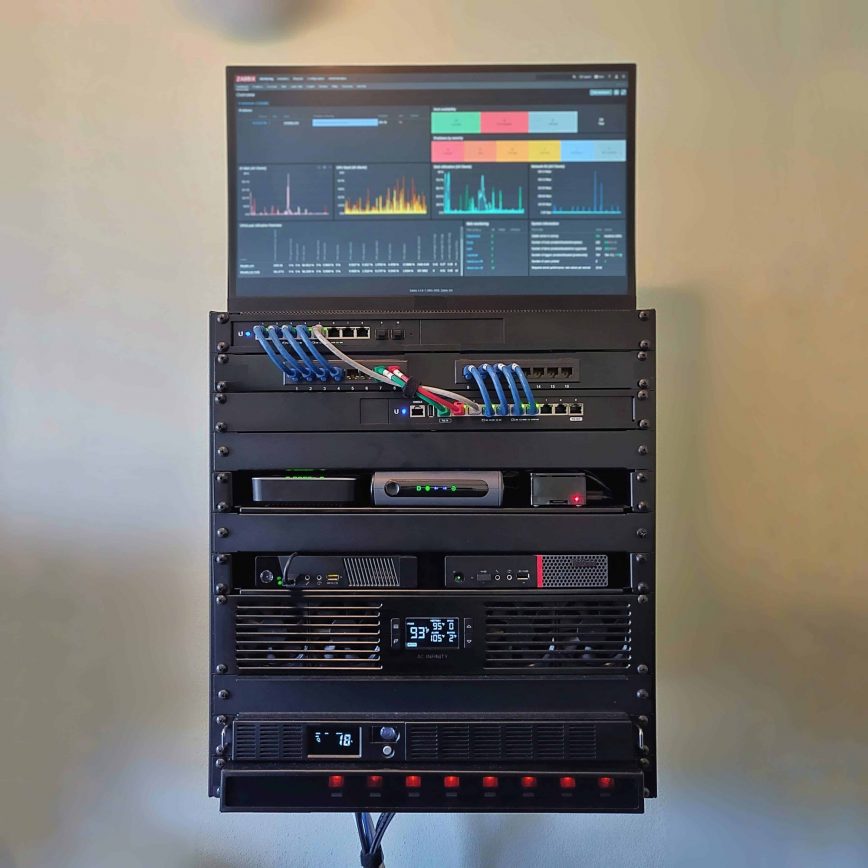-
The article details the author’s journey from a nomadic lifestyle to setting up a home lab for technical experimentation and growth. It covers the importance of choosing a location, deciding on furniture to store equipment, and selecting the right hardware. Key insights include the purpose and benefits of having a home lab, considerations for selecting its location, equipment storage, and hardware selection.
Main Points- Purpose of a Home LabA home lab provides an environment to experiment, fail, and learn in the privacy of one's own home, encouraging technical growth and innovation.
- Importance of Location SelectionSelecting a location for a home lab involves considering several key factors including temperature, space, power, and accessibility to optimize the lab's effectiveness.
- Choosing the Right FurnitureWhen setting up a home lab, it's crucial to choose the right type of rack or cabinet to store equipment based on the individual needs of the hardware.
- Selection of HardwareBuilding a home lab involves understanding the technical requirements and selecting hardware that matches the lab's goals and user's skill level.
122004763 -
Ollama now offers support for AMD graphics cards on Windows and Linux platforms, with a broad array of supported graphics cards including Radeon RX, Radeon PRO, and Instinct models. The platform plans to extend support to more AMD graphics cards in the future.
Main Points- Support for AMD graphics cardsOllama extends support to AMD graphics cards, enabling users to leverage their computing power for enhanced performance.
- Wide range of supported AMD cardsA comprehensive list of AMD graphic cards across various families such as Radeon RX, Radeon PRO, and Instinct are now supported.
- Future support for additional cardsOllama plans to expand the list of supported AMD graphics cards, showcasing a commitment to broad accessibility and compatibility.
122004763 -
GhostRace is a comprehensive security analysis that identifies speculative execution vulnerabilities within common synchronization primitives in Linux and potentially other platforms. It reveals that Speculative Race Conditions (SRCs) can compromise architecturally race-free critical regions, enabling information leakage. The study proposes a mitigation strategy that balances security enhancement with minimal performance impact.
Main Points- Analysis of Speculative ExecutionA deep analysis on speculative execution reveals vulnerabilities in synchronization primitives across Linux and potentially other platforms
- Implications of SRCsSRCs (Speculative Race Conditions) enable information leakage, challenging the foundational security assumptions of critical regions in code
- Significance of GhostRace's FindingsA pioneering study, GhostRace uncovers serious flaws in current synchronization mechanisms, suggesting a reevaluation of security approaches
- Proposed Mitigation StrategyThe proposed mitigation, adding an lfence instruction post-lock comparison, balances security enhancement with minimal performance impact
122004763
We can't find the internet
Attempting to reconnect
Something went wrong!
Hang in there while we get back on track

Tags
see all- Technology
- AI
- Open Source
- programming
- AI and Machine Learning
- Elixir
- Artificial Intelligence
- philosophy
- Personal Growth
- Rust
- business
- social change
- software development
- Python
- machine learning
- innovation
- Linux
- DIY
- collaboration
- Nominatim
- architecture
- Entertainment
- performance improvement
- performance
- education
- Android
- PostgreSQL
- Docker
- Deadspin
- ActivityPub
- Slint
- Developer Experience
- NixOS
- SQL
- Drone
- neural networks
- simulation
- Erlang
- Journalism
- Entrepreneurship
- LLM
- scalability
- Concurrency
- fault tolerance
- immutable URLs
- Nix
- productivity
- WebAssembly
- Database
- Generative AI
- Security
- Home Lab
- deployment
- ESP32
- Language Models
- automation
- Data Visualization
- Markets
- Networking
- Ecto
- computing
- BEAM
- metal recovery
- Quantum Computing
- Robotics
- Web 2.0
- financial wellbeing
- harsh environments
- Miniaturization
- eclipse safety
- Public Health
- Web PKI
- Chess
- Transparency
- memory allocation
- safety
- brinespace
- Diversity
- brewer's yeast
- hardware review
- Cryptanalysis
- compiler backend
- anterior neostriatum
- compression
- Psychology
- Vulnerabilities
- computational complexity
- luxury
- Windows
- Natural Language Processing
- cloud native
- Legal Battle
- maintainability
- Lifestyle
- US Jobs Market
- Mike Benz
- dinosaurs
- Investment Strategy
- Xerox Park
- design
- Bletchley Park
- gaming
- Consumer Advice
- AI Democratization
- Economy
- Behavioral Biology
- Particles
- Parallelism
- brain abnormalities
- Query Optimization
- Church Growth
- Mathematics
- WWII
- problem-solving
- Cerebras Systems
- structured inference
- API
- LaVague
- mechanical design
- UNIX
- Certificate Transparency
- Ericsson
- Iman Gadzhi
- Thermodynamic Computing
- Nvidia
- electrolyte solutions
- setup simplicity
- Synchronization Primitives
- Wasmtime
- work-life balance
- Big Tech
- LLMs
- Twitch
- Tucker Carlson
- Garbage Collection
- machining
- Personal Reflection
- free speech
- Generosity
- Sports Stadiums
- Ash 3.0
- WebTransport
- celestial event
- ChatGPT
- processor-controlled
- computer graphics
- Actor model
- oral rehydration solution
- Missouri v. Biden
- password security
- Academic Freedom
- developer tools
- capitalism
- compilation
- total solar eclipse
- Performance Engineering
- Effective Methods
- 3D printing
- Wi-Fi Control
- hardware-controlled
- S&P 500
- Telemetry
- Encoding
- Theology
- First Amendment
- ISO GQL
- Web Monitoring
- Data Compression
- development environment management
- intelligence agencies
- Satire
- Divine Healing
- NSA
- WSE-3
- corporate media
- YouTube
- Project Management
- Sunlight
- basal ganglia
- constraints
- Online Learning
- Mobile App Development
- Medical Technology
- teamwork
- Server Management
- High-Performance Computing
- aviation
- Hugo Barra
- processes
- GUI Toolkit
- Foreign Data Wrapper
- Debugging
- spiritual experience
- indie game development
- kernel exploitation
- note-taking
- Cost-saving
- biosorption
- shuffle
- Probabilistic Machine Learning
- Economic Trends
- Media Criticism
- CMOS integrated circuits
- GPU security
- Technology Criticism
- health benefits
- Upptime
- Flutter
- Jensen Huang
- copyright
- Logging
- Memory Tagging Extension
- streaming service
- undecidability
- Enigma
- Speculative Execution
- remote work
- Coding
- Social Responsibility
- Corporate Profits
- Adm. Hyman G. Rickover
- Cipher
- Stable Video 3D
- AI Chip
- Nostr
- boot sequence
- APIs
- Pixel 8
- management
- register allocation
- Jordan Peterson
- Non-Transformer Models
- NewsGuard
- Computer Systems Research
- Content Creation
- system administration
- navy
- Software Support
- nuclear submarine
- Veeps
- Elisp
- StashPad Docs
- Truth
- Pentecostal Movement
- Categorical Thinking
- Deglobalization
- live sports
- Annual Letter
- cholera
- GitHub Actions
- Vaccine Mandates
- Flox
- devops
- Containerization
- E-graphs
- NP class
- Data Contamination
- Function Calling
- table formatting
- treatment
- Internet Iron Curtain
- Extropic
- AR
- Ovid
- development
- Federated System
- National Science Foundation
- Operating Systems
- functional programming
- Cypher
- JIT Compiler
- community discourse
- virtual environment
- Nostalgia
- RISC
- time management
- WebRTC
- Microsoft Research
- CIA
- AMD Graphics Cards
- Murthy v. Missouri
- superoptimization
- Geocoding
- GUI
- package manager
- Chips
- Evangelism
- low-cost project
- Wikipedia
- mammals
- communication
- Standards
- library
- OpenAI
- Selenium
- weight loss
- workplace culture
- Cranelift
- diagnosis
- pattern-matching
- troubleshooting
- Handheld Devices
- Circuit Digest
- Statistical Analysis
- AppSignal
- Parallel Computing
- titanosaurs
- spy agencies
- Meta
- The New York Times
- Torsion Springs
- Deep Packet Inspection
- leadership
- Growth
- OpenStreetMap
- Zed
- Ollama
- Let's Encrypt
- Richard Stallman
- GPU Clusters
- life advice
- Garnet
- software failure
- COVID-19
- LiveView
- Turing Machines
- federated models
- operating system
- GPUI
- Long-Polling
- text renderer
- software
- flash memory
- message passing
- AI-driven development
- Genetics
- community building
- schema migration
- cache-store
- Live-Preview
- evaluation
- BSD
- real-time communication
- software engineering
- video games
- hoaxes
- Church-Turing Thesis
- Algorithm
- Human Behavior
- workflows
- conditional
- Log-Normal Distribution
- CRDT
- AI Supercomputers
- Tablex
- FBI
- Garage Door Repair
- TypeScript
- Technology Trends
- Software Release
- pcase
- e-waste management
- N-channel diamond MOSFET
- Hollywood
- Lockdowns
- reptiles
- coding environment
- asynchronous communication
- Emacs
- Uppttime
- biometrics
- Financial Woes
- Blackwell
- 3D generation
- Learning Curve
- computational models
- Structured Logging
- Berkeley
- Server-Sent Events
- Race Conditions
- The Jet Business
- misinformation
- Stashpad
- Customization
- bitfield
- software critique
- Stability AI
- reinforcement learning
- VIBES
- immersive technology
- UI development
- Fingerprinting
- In-Context Learning
- scaling
- SIMA
- Regression Analysis
- Techno-Optimism
- Algorithm Design
- AT&T
- AI Acceleration
- Domain Modeling
- RP2040
- incident commander
- Personal Pronouns
- Ultrasound
- OpenVPN
- diamond electronics
- Hardware Selection
- theoretical computer science
- Notifications
- dehydration
- execution plan
- CVE-2023-6241
- animal behavior
- Google Docs alternative
- macOS
- Patience
- developmental language disorder
- Culture
- Johnny Depp
- hash table
- Sports
- browser automation
- Vision Pro
- nuclear navy
- authentication
- Database Innovation
- knowledge sharing
- Technology History
- virtual reality
- Xerox PARC
- UI/UX Design
- Transition
- WebSockets
- VS Code
- Computer Science
- cryptography
- .NET
- Daytona
- Android security
- Optimization
- PRQL
- Servers
- media bias
- Neovim
- VPN
- code-generation
- Design Systems
- censorship
- user code execution
- Capabilities
- Queries
- game design
- randomness
- x86
- Wafer Scale Engine 3
- lawsuit
- Source Code
- AI agent
- private jet
- PCB design
- Redis
- graph theory
- system design
- Abundance
- Cybersecurity
- sustainable technology
- Tools Format
- Phoenix
- system efficiency
- MEMS
- Decision Table
- Alan Kay
- Public Image
- Management Disputes
- computer vision
- Graph Database
- cond*
- Infrastructure
- Encyclopedia
- VR
- ARPA
- web development
- Apple
- Hermes-2-Pro-Mistral-7B
- DuckDB
- Unison
- disinformation
- sauropod
- Computability
- Feature Learning


